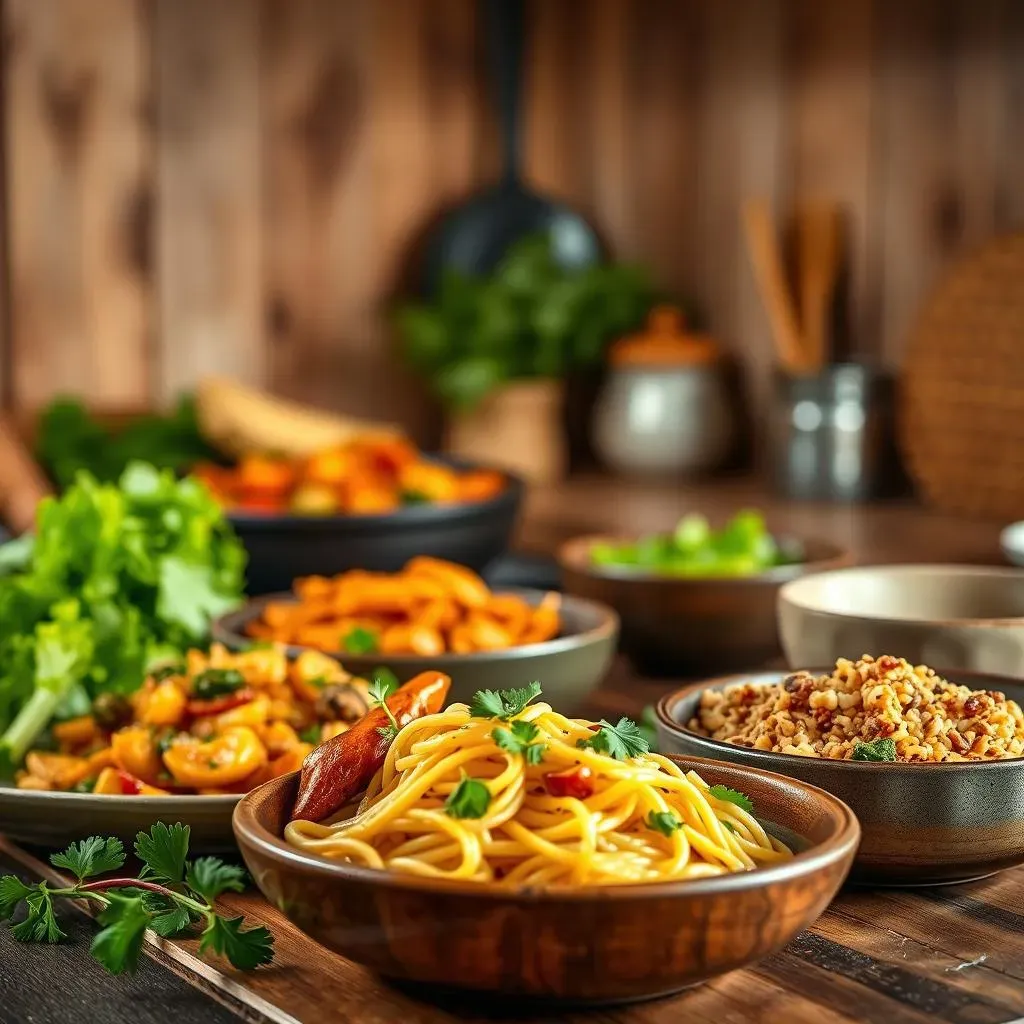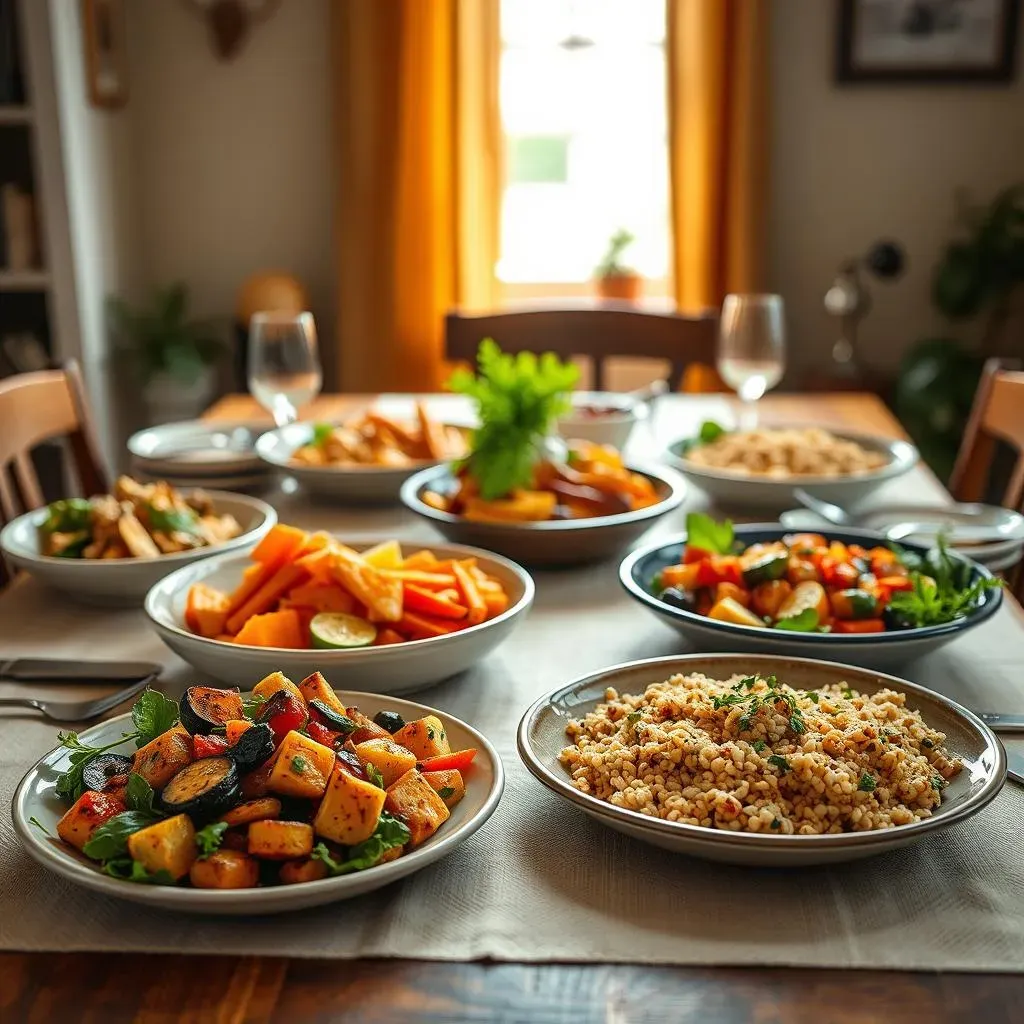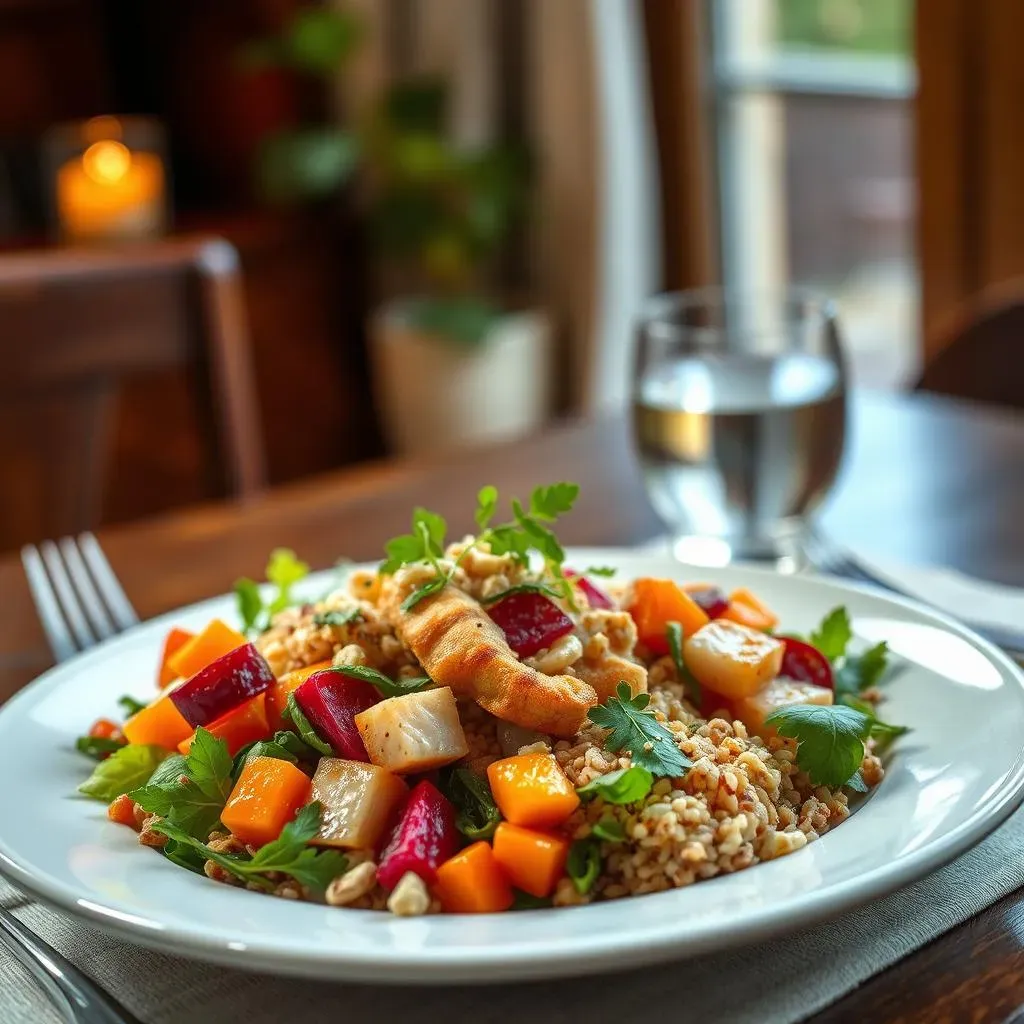Table of Contents
Ever stare into your fridge, wondering what can be a healthy dinner that isn't a sad, wilted salad? I've been there, trust me. It's easy to fall into the "pizza again?" trap, but what if I told you that eating well doesn't have to be a chore? This article is your guide to making delicious, nutritious dinners that are both good for you and actually enjoyable. We're not talking about rabbit food here; we're talking about real meals that fuel your body and make your taste buds happy. We'll explore quick and easy options for busy weeknights, dive into the essential nutrients that make a dinner truly healthy, and give you a framework for planning a week of balanced meals. Think of this as your roadmap to a happier, healthier dinner routine – no culinary degree required. So, ditch the takeout menus and let's get cooking!
Quick and Easy Healthy Dinner Ideas

Quick and Easy Healthy Dinner Ideas
The 15-Minute Miracle Meals
Okay, so you're staring at the clock, wondering how dinner is going to happen. I get it. Life gets hectic, and sometimes, cooking feels like climbing Mount Everest. But fear not! There are tons of meals you can whip up in 15 minutes or less that are both healthy and satisfying. Think quick stir-fries with pre-cut veggies, a simple pasta dish with canned tomatoes and beans, or even a hearty omelet loaded with your favorite toppings. The key here is to keep it simple, use ingredients you already have on hand, and don't be afraid to rely on some kitchen shortcuts.
For me, a lifesaver is always a good grain bowl. I toss together some quinoa or couscous, whatever veggies are in the fridge (even frozen ones work!), and a can of chickpeas or lentils. A drizzle of olive oil and a squeeze of lemon, and boom! Dinner is served. It's all about having a few go-to recipes that you can make with your eyes closed. No need to be a gourmet chef to eat well.
Speedy Strategies for Weeknight Wins
Another game-changer? Planning ahead. It doesn't have to be some elaborate meal prep situation. I'm talking about doing little things like chopping veggies on the weekend or having a list of quick meal ideas on your phone. It really does make a difference when you're rushed and hungry. I often find myself using the slow cooker to my advantage. Throw some chicken, veggies, and spices in the morning, and you have a delicious, healthy dinner ready when you get home. It's like having a personal chef, but without the hefty price tag.
Don't underestimate the power of a good pantry either. Canned beans, lentils, whole wheat pasta, and frozen veggies are your best friends when time is of the essence. And don't be afraid to get creative! Sometimes the best meals are the ones you throw together with whatever you have. The goal is to make healthy eating as easy and convenient as possible, so it becomes a habit, not a hassle. Remember, it's about progress, not perfection.
Quick Meal Idea | Main Ingredients | Prep Time |
|---|---|---|
Chickpea Pasta | Whole wheat pasta, canned chickpeas, tomato sauce | 15 minutes |
Veggie Stir-fry | Pre-cut veggies, soy sauce, rice | 10 minutes |
Lentil Soup | Lentils, broth, carrots, celery | 20 minutes |
NutrientPacked Recipes for a Balanced Dinner

NutrientPacked Recipes for a Balanced Dinner
The Power of Protein
Let's talk protein, the building block of our bodies. It's not just for bodybuilders, you know. Protein helps you feel full, keeps your muscles strong, and is essential for overall health. When it comes to dinner, think beyond just a plain piece of chicken. There are so many delicious ways to get your protein fix. I'm a huge fan of lentil stews, they're packed with protein and fiber, and they're super budget-friendly. I also love adding chickpeas to almost anything for a little protein boost. And if you are a meat-eater, lean proteins like turkey or fish are great choices.
Don't be afraid to experiment with different sources of protein. Tofu, tempeh, and quinoa are all fantastic plant-based options that can make your dinner exciting and nutritious. Remember, variety is key to getting all the nutrients you need. It's about finding what works for you and your taste buds. And honestly, sometimes the simplest meals are the most satisfying. A piece of grilled salmon with some roasted veggies? Perfection!
Vibrant Veggies and Fantastic Fiber
Okay, let's be real, veggies aren't always the most exciting thing on your plate, but they are so important. They're packed with vitamins, minerals, and fiber, which is essential for digestion and keeping you feeling full. The trick is to make them delicious. Roasting veggies with some olive oil and spices can bring out their natural sweetness. I love roasting broccoli, carrots, and sweet potatoes together. It's like a party in my mouth. And don't forget about leafy greens like spinach and kale. You can add them to almost any dish for a quick nutrient boost.
Fiber is also a game-changer. It helps with digestion, keeps you feeling full, and can even help regulate your blood sugar levels. Whole grains like brown rice and quinoa are great sources of fiber. So are beans and lentils. The more fiber you have in your dinner, the more satisfied you'll feel. I try to make sure that every dinner has at least two servings of veggies and a good source of fiber. It makes a huge difference in how I feel.
Nutrient | Food Source | Benefit |
|---|---|---|
Protein | Lentils, chicken, tofu | Muscle growth and repair |
Fiber | Brown rice, veggies, beans | Digestion and fullness |
Vitamins | Leafy greens, colorful veggies | Overall health and well-being |
The Importance of Healthy Fats
Fats often get a bad rap, but healthy fats are actually essential for your body. They help you absorb vitamins, keep your brain sharp, and are a great source of energy. Think about adding some avocado to your salads, drizzling olive oil on your roasted veggies, or sprinkling some nuts and seeds on your meal. These healthy fats will not only make your meal more satisfying but will also provide important nutrients. I often add a handful of walnuts or almonds to my dinner, they're great for a little crunch and a healthy fat boost.
It's all about balance, though. You want to choose healthy fats over unhealthy ones. Avoid processed foods and trans fats as much as possible. Stick to natural sources of fat like avocados, nuts, seeds, and olive oil. And don't be afraid to experiment with different flavors and textures. It's amazing how a little bit of healthy fat can elevate a meal. Remember, eating well is about nourishing your body and enjoying the process. So, go ahead, add a little bit of healthy fat to your dinner, you deserve it!
What Makes a Dinner Healthy: Key Components

What Makes a Dinner Healthy: Key Components
The Balance Act
So, what really makes a dinner healthy? It's not about deprivation or bland food, it's about balance. Think of it like a well-choreographed dance, where each component plays its part. You need a good mix of protein, carbohydrates, and healthy fats, all working together to fuel your body and keep you feeling your best. It’s about making sure your plate has a variety of colors and textures. For me, I always aim to have at least three different food groups on my plate. That way, I know I'm getting a good mix of nutrients.
It's important to remember that "healthy" looks different for everyone. What works for me might not work for you, and that's totally okay. The key is to listen to your body and find what makes you feel good. Don't get caught up in diet fads or restrictive eating plans. Focus on nourishing your body with wholesome, real food. And remember, it's not about being perfect, it's about making progress. It's about making mindful choices that support your overall health and well-being. For example, when I have a craving for something sweet, I'll have some dark chocolate and fruit instead of cake. Small changes can make a big difference.
Key Component | Why It's Important | Examples |
|---|---|---|
Protein | Muscle repair, satiety | Chicken, beans, tofu |
Carbohydrates | Energy, fiber | Brown rice, sweet potatoes, quinoa |
Healthy Fats | Vitamin absorption, brain function | Avocado, nuts, olive oil |
Mindful Eating
Beyond just the food itself, how you eat is also a big part of the equation. Mindful eating is the practice of paying attention to your food and how it makes you feel. It's about slowing down, savoring each bite, and tuning into your body's hunger cues. When you eat mindfully, you're more likely to make healthier choices and less likely to overeat. I've found that putting my phone away during meals really helps me focus on the food and enjoy the experience more. It's like a mini meditation session, and it makes a huge difference in how I feel.
Eating healthy shouldn't be a stressful or restrictive experience. It should be about nourishing your body and enjoying the process. So, take your time, savor your meals, and listen to what your body needs. And don't be afraid to experiment with different foods and flavors. The more you enjoy your food, the more likely you are to stick with healthy eating habits. It's about building a sustainable relationship with food that supports your overall well-being. Remember, it's not just about what you eat, but also how you eat.
Planning Your Week of Healthy Dinners

Planning Your Week of Healthy Dinners
The Power of Planning
Okay, so you've got the healthy dinner ideas down, but how do you actually make it happen consistently? That's where meal planning comes in. It might sound a little boring, but trust me, it's a game-changer. When you plan your dinners for the week, you're less likely to resort to takeout or unhealthy options. I like to sit down on a Sunday and map out my dinners for the week. It doesn't have to be super detailed, just a general idea of what I'm going to eat each night. It saves me a lot of stress and decision fatigue during the week.
Think of it like having a roadmap for your healthy eating journey. Without a plan, you're more likely to get lost and end up in the drive-through lane. Meal planning helps you make conscious choices about what you're going to eat, rather than just grabbing whatever is easiest. It also helps you save money, since you're less likely to waste food. And let's be honest, who doesn't love a good excuse to avoid the grocery store during the week? For me, it is about making healthy eating feel less like a chore and more like a natural part of my routine. It's about setting yourself up for success.
Theme Nights and Batch Cooking
To make meal planning even easier, I love using theme nights. For example, Monday could be "Meatless Monday," Tuesday could be "Taco Tuesday," and so on. It makes it easier to come up with dinner ideas and also adds a little fun to the routine. I find that having a theme helps narrow down my choices and makes the whole process less overwhelming. Another strategy I rely on is batch cooking. This is when you cook a big batch of something, like a soup or a chili, and eat it throughout the week. It saves time and ensures you always have a healthy meal on hand. I also love making a big batch of roasted veggies on Sunday to throw into meals during the week.
It's about finding what works for you and your lifestyle. Maybe you prefer to plan out every meal in detail, or maybe you're more of a general idea kind of person. That's totally fine. The key is to make meal planning a sustainable habit, not a stressful chore. And remember, it's okay to have some flexibility. Life happens, and sometimes you need to switch things up. The goal is to have a framework in place that makes healthy eating feel less daunting and more manageable. Don't be afraid to experiment and find what works best for you.
Theme Night | Example Meal |
|---|---|
Meatless Monday | Lentil soup |
Taco Tuesday | Black bean tacos |
Pasta Wednesday | Whole wheat pasta with veggies |
Grocery Shopping Smart
The final piece of the puzzle is grocery shopping. Now that you have your meal plan, you need to make sure you have all the ingredients you need. I like to make a list based on my meal plan and stick to it. It helps me avoid impulse buys and saves me money. I also try to shop the perimeter of the grocery store, where most of the fresh produce, meats, and dairy are located. The aisles are where the processed foods usually live, so I try to spend less time there. It's all about making conscious choices about what you're putting in your cart.
And don't forget to read labels! It's important to be aware of what's in your food, especially when it comes to added sugar, salt, and unhealthy fats. I try to choose whole, unprocessed foods as much as possible, and I always look for the shorter ingredient lists. The fewer ingredients, the better. It's about being an informed consumer and making choices that support your health goals. Remember, grocery shopping is an important part of your meal planning process. It's about setting yourself up for success, so you can easily prepare healthy dinners throughout the week. And don't forget to treat yourself occasionally, a little bit of what you fancy won't hurt you.
Wrapping Up Your Healthy Dinner Journey
So, there you have it – a bunch of ideas and tips to help you figure out what can be a healthy dinner. Remember, it’s not about perfection, it's about progress. Don't stress over every single ingredient. Instead, focus on incorporating more whole foods, experimenting with flavors, and finding meals that you genuinely enjoy. The goal is to make healthy eating a sustainable part of your life, not a temporary diet. So, go ahead, get creative in the kitchen, and make dinner time something you actually look forward to. You've got this!